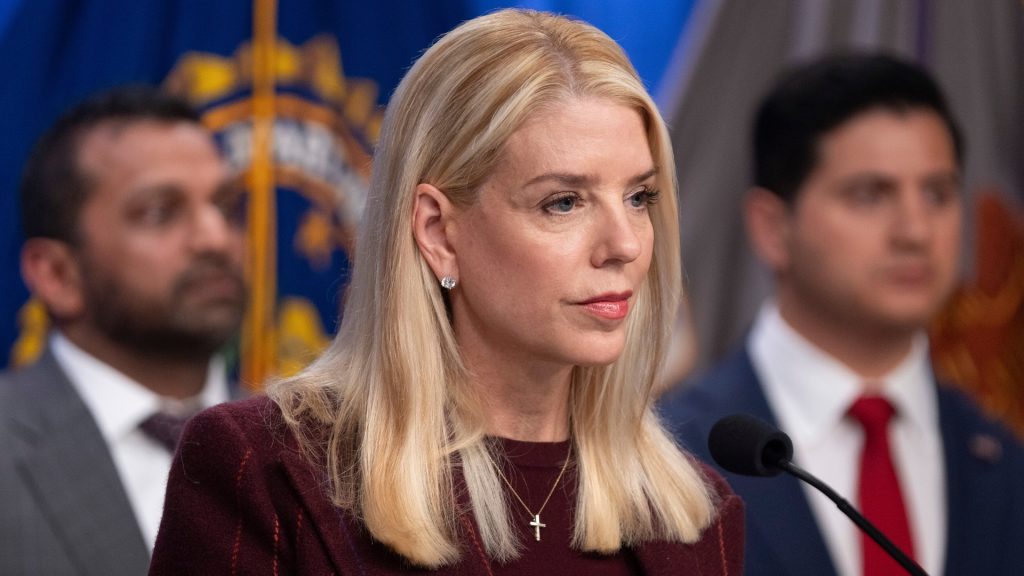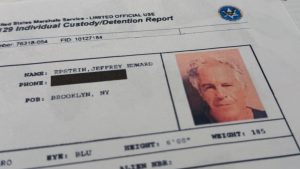DOJ could refuse release of some Epstein files despite Trump’s signature

The Justice Department is now required to release all data it has relating to convicted sex offender Jeffrey Epstein after President Donald Trump signed legislation sponsored by Reps. Thomas Massie, R-Ky., and Ro Khanna, D-Calif., late Wednesday. The bipartisan legislation doesn’t contain enforcement mechanisms for the DOJ, leaving ambiguity around what could be withheld.
The clock starts ticking Thursday for U.S. Attorney General Pam Bondi to gather and submit all department data relating to Epstein within 30 days, according to the bill. But the law lacks clarity on how the 30 days are counted, what could happen if Bondi defied the law and what it means for information to be “publicly available.”
A provision in the law could allow for Bondi to withhold documents that “would jeopardize an active federal investigation or ongoing prosecution, provided that such withholding is narrowly tailored and temporary.” That could allow for a document delay after Trump directed Bondi last week to investigate Epstein’s relationships with his political foes. Emails included mentions of former President Bill Clinton, Democratic megadonor Reid Hoffman and bank JP Morgan Chase.
Bondi told reporters Wednesday before Trump signed the bill that her department would “follow the law” even after it became law, but didn’t elaborate further.
“We have released 33,000 Epstein documents to the Hill and we’ll continue to follow the law and to have maximum transparency,” she said.
The trick comes for Congress if Bondi defies any subpoenas, as the Justice Department would be the investigative authority to review Bondi’s actions for criminal charges — a move that has never happened for a sitting attorney general. John N. Mitchell is the only attorney general to be criminally prosecuted, which happened after he left office during the fallout of former President Richard Nixon’s Watergate scandal, according to Mitchell’s obituary in The New York Times.
Trump’s directive was controversial at the time as the federal government was shut down and he accused Democrats for trying to “deflect” from the closure. He later coined newly released emails from Epstein’s estate as the “Epstein hoax.”
Trump changed course on Epstein, once again, and lauded himself for signing the bill with intentions of revealing alleged associations with his foes. He didn’t support the Epstein Files Transparency Act until after Speaker of the House Mike Johnson, R-La., swore in Rep. Adelita Grijalva, an Arizona Democrat who promised to be the final vote to get the bill presented on the House floor.
Trump wrote on Truth Social the Justice Department gave Congress more than 50,000 pages of documents while claiming the Biden administration failed to do so.
“Perhaps the truth about these Democrats, and their associations with Jeffrey Epstein, will soon be revealed, because I HAVE JUST SIGNED THE BILL TO RELEASE THE EPSTEIN FILES,” he said in a Truth Social post.
Justice Department has 30 days to release files
According to the legislation, Bondi must make all files publicly available in a searchable and downloadable format in about a month. That release includes all unclassified records, documents, communications and investigative materials her department possesses.
Beyond records that relate to Epstein and his former girlfriend and co-conspirator Ghislaine Maxwell, other records could include:
- Travel records for all of Epstein’s aircraft and vehicles,
- Government officials and individuals either named or referenced in Epstein’s criminal proceedings,
- Any entity with known or alleged connection to Epstein or his financial network,
- Sealed documents,
- Internal DOJ communications,
- Documents concerning Epstein’s 2019 death and
- Any communication or record regarding altering or deleting data relating to him, his associates, detention, death and investigative files.
“No record shall be withheld, delayed, or redacted on the basis of embarrassment, reputational harm, or political sensitivity, including to any government official, public figure, or foreign dignitary,” according to the legislation.
Massie and Khanna wrote the legislation to include an accountability measure for any redactions that anyone makes, requiring a written report to Congress and unclassified summaries.
After the 30 days is up, Bondi has 15 days to submit a full report to the House and Senate judiciary committees that detail what’s released, what’s withheld, a summary of redactions plus applicable laws or legal opinions and a list of “government officials and politically exposed persons named or referenced.”
Epstein: A convicted sex offender
Epstein was well-known in finance, managing multiple portfolios and constantly reviewing with advisers at JPMorgan Chase and other investment banks ways to build his wealth. He was also a socialite, befriending former President Bill Clinton, Trump, several other politicians, wealthy individuals and celebrities.
Unbiased. Straight Facts.TM
The Epstein Files Transparency Act passed in the House of Representatives, 427-1, and unanimously in the Senate.

In 2008, Epstein pleaded guilty in Florida to sex crimes involving children and was required to register as a sex offender. He grew in prominence as financier, which was evident in emails as he sought financial advice from JPMorgan Chase and market analysis subscriptions.
The Department of Justice indicted Epstein in 2019 on one count of sex trafficking and another count of conspiracy to commit such. They alleged he sexually abused and exploited dozens of minor girls in New York, Florida and other locations from 2002 to 2005, according to the indictment.
Epstein, 66, died in 2019 inside his Manhattan jail cell, which federal authorities concluded was a suicide. The public and lawmakers questioned the circumstances around his death, spurring investigations into corrections officers’ conduct and conditions in Epstein’s cell.
Maxwell was sentenced in 2022 to a 20-years in prison for working with Epstein to sexually exploit minors for decades, the DOJ announced in 2022.
Provisions in the law
An open investigation isn’t the only provision written in the law to allow Bondi to withhold certain documents, with notice to Congress.
She can either withhold or redact parts of the files that identify victims, their personal and medical files, and any other files that would be an unwarranted invasion of privacy. Records that show child sexual abuse materials, death, physical abuse or injury to anyone can be removed or withheld from the public.
The final provision could happen through Trump’s doing — an executive order. If Trump were to issue an executive order that classified information within the Epstein files as they pertain to the military or foreign policy, Bondi can refuse the release. Massie and Khanna did, however, limit any order on classifying files to those that were created after July 1 of this year.
“If the Attorney General makes a determination that covered information may not be declassified and made available in a manner that protects the national security of the United States, including methods or sources related to national security, the Attorney General shall release an unclassified summary for each of the redacted or withheld classified information,” according to the legislation.
Absent in the law is how Congress will hold the Justice Department accountable for refusing to release any of the Epstein files. Rep. Robert Garcia, D-Calif., issued a House Oversight Committee subpoena that he said prevents Bondi from refusing to turn over the files.
“She is still legally obligated, regardless of any investigation, to produce every single document, photo, video or material that she has in possession of the DOJ, to the Oversight Committee,” he said.
The post DOJ could refuse release of some Epstein files despite Trump’s signature appeared first on Straight Arrow News.





